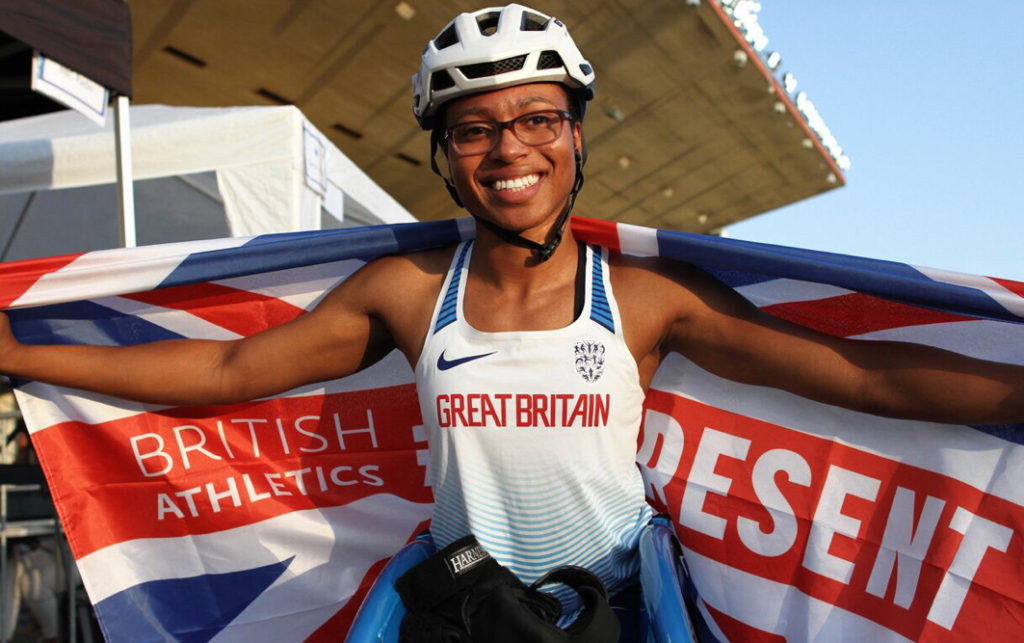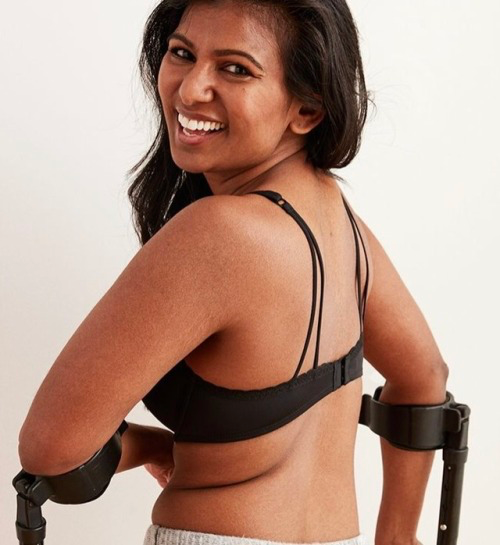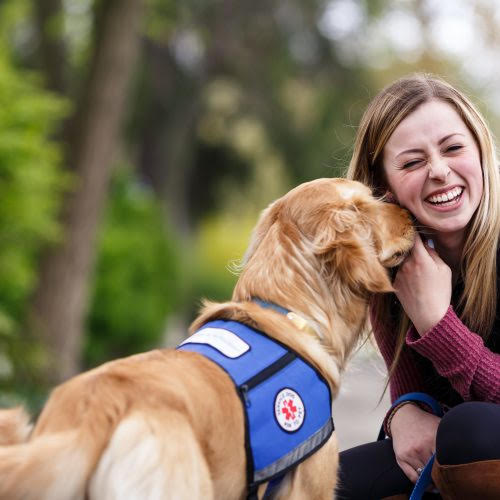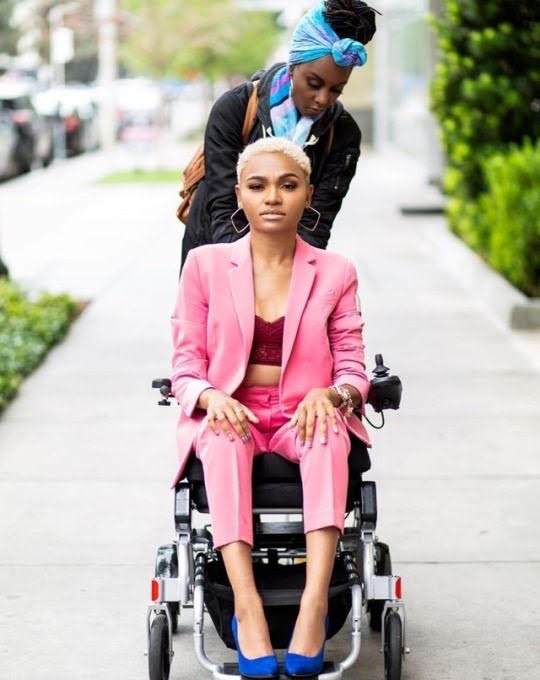
1. Tell us about yourself! What’s your story? How has your disability impacted your mental health?
Hi, I’m Kare Adenegan, I’m a history student at Warwick University and a Paralympic track athlete. I have a disability called Cerebral Palsy Diplegia which occurred as a result of my premature birth. My disability means that I use a wheelchair most of the time because my legs are quite stiff and I’m unable to walk long distances. I started athletics after watching the London 2012 Paralympic games and went to my first Paralympic games in Rio 2016 representing Great Britain in the 100m, 400m and 800m.
Growing up, my disability really affected my mental health, I lacked confidence and questioned my future a lot. I constantly worried about how my disability would impact my life as an adult and my disability also affected my ability to make friends. In primary school I felt a bit out of place, my feelings were partly linked to the fact that I was often excluded from doing sport at school, so I felt like sport wasn’t for people like me. However, participating in sport from the age of 11 really helped to boost my body confidence and benefited my mental health.
2. What is a disability? Are all disabilities visible or noticeable?
There are several definitions for a disability, however a lot of them are quite degrading. I would personally define a disability as a physical or mental condition that affects your everyday life. It’ s so hard to define a disability because each experience is different, but I think that’s a general definition.
Not all disabilities are visible, many are invisible so in that sense, we also cannot make any assumptions about the abilities of others.
3. What are common misconceptions about disabled women?
Some able-bodied people may consider disabled women as dependent on others and weak in some respects, which is so untrue. There is a common view that disabled people don’t live completely normal lives which we do, we get on with things like everybody else and can live independent lives. Disabled women are also strong, in every sense of the word!

4. What does discrimination against disabled women look like? Examples? How do you get around it or overcome it?
The discrimination that I have experienced as a disabled woman is largely linked to accessibility. For example, trying to get into a restaurant but being met with several flights of stairs, a lack of disabled toilets in restaurants and other public spaces, being unable to attend music concerts because there’s no accessible viewing areas.
These issues are difficult to overcome because they depend on business owners and larger corporations making changes to make venues accessible for wheelchair users.
5. What is your advice for disabled women who are struggling with depression or anxiety or feel like a burden to their loved ones, due to their disability?
You are not a burden and shouldn’t feel like one. Reach out to a person you trust and talk about how you feel, also don’t be afraid to seek professional help. I have also found that sport helps me when I feel anxious, even just light stretches. There are loads of accessible workout videos on social media which might be useful.

6. How can able bodied people help or empower disabled women?
The most important thing is communication, ask disabled women how you can help, for example if you want to give physical assistance don’t just assume that they need your help, they might be fine doing it themselves. Support disabled women’s businesses and other endeavors this is also a great way to show that you care. Also consider how to make your online content more accessible, for example that might mean adding captions to your videos.
7. From your personal experience, would you say, your disability has caused social isolation? How has your disability impacted your love life and relationships (both romantic and platonic)?
My disability has definitely affected my friendships, when I was at school, sometimes my classmates wanted to play in areas of the playground that were inaccessible which resulted in lunchtimes alone. As I grew older, I also found myself isolated at times due to accessibility issues, for example a broken lift. I often questioned why my friends could not sacrifice their comforts to spend time with me in accessible areas. But mostly, my friendships have not been hindered by my disability, especially at University, I think my friends have looked well beyond my disability.

8. Disabled women are often seen as physically vulnerable to perpetrators. What is your advice for disabled women who want to learn self defense?
(Sorry I can’t answer this question, I’m not sure to be honest, I also don’t know self-defense, but I have done a bit of sparring so if all else fails maybe I could throw a good punch :))
9. I assume that having a disability can be physically and mentally exhausting, what keeps you going? What is the most life giving source for hope and perseverance in your life and why?
In one sense, my sporting goals keep me going, I want to get stronger and faster which really acts as motivation for each training session.
However, overall my faith keeps me going. I gave my life to Christ when I was eight years old and Jesus continues to be my strength and refuge. Having a disability can be hard but God helped me to accept my disability, I didn’t accept it until I really came to know him. He showed me that he can use what the world perceives as a weakness to display his strength (2 Corinthians 12:9). He showed me that my identity is in Him, not sport, not achievements, not my disability. 1 Samuel 16:7 explains how God sees the heart not the outer appearance and in life it seems that people see the wheelchair first but God doesn’t for sure! In times like these especially, reading His word, praying and worshipping has provided so much mental strength in all the chaos and uncertainty, I still get a bit anxious about the future but at least in knowing Jesus, I know God is in control.

10. In your opinion how does the church and Christians view those with disabilities. Is it stigmatized in any way? If so, is that stigma harmful to disabled people?
I think the church has a loving attitude towards disabled people. My experiences in church have been mostly positive. The only thing that I think needs to be addressed is the assumption that some people hold, not all, that disabled people require healing. The topic is extremely triggering for me, because I am a disabled person who has been to several ‘healing services’. I 100% believe that God can heal people and I believe he still does, but I know of many disabled people whose encounters with Christians on the street tend to be linked to healing. Christians want to pray for them on the street as they are going about their business, and I get it, they mean it with the purest intent. But not all disabled people want to be healed and that’s where the stigma lies, the assumption is that disabled people are incomplete or aren’t happy the way they are. I’ve had many pastors pray for my healing, I still have cerebral palsy but it hasn’t completely put me off the faith, but the danger is that it can do that. God is so good and if we want to tell a disabled person about Jesus, let’s start with the gospel and how Jesus overcame death, I want people to know him most importantly! 🙂